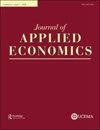使用不同的估计情景预测俄罗斯作为主要排放国2030年的二氧化碳减排目标
IF 1.4
4区 经济学
Q3 ECONOMICS
引用次数: 1
摘要
本文章由计算机程序翻译,如有差异,请以英文原文为准。
Forecasting 2030 CO2 reduction targets for Russia as a major emitter using different estimation scenarios
ABSTRACT This study firstly analyzes the impact of energy intensities and income on CO2 emissions in Russia, applying different estimation methods to the data period from 1990 to 2020. In addition, the study forecasts CO2 emissions considering 2030 targets under different assumptions and assesses the achievability of the set target. The estimation results concluded that the GDP and fossil fuel intensities of GDP have a statistically positive impact on CO2 emissions. Also, we found that the forecasted value for 2030, for the business-as-usual case, is 1750 MtCO2, with 95% confidence interval values of 1703 MtCO2 and 1796 MtCO2. This result shows that Russia needs to undergo substantial policy interventions to achieve its targets to reduce CO2 emissions. As the fifth biggest emitter, Russia missing its emissions targets will have undesirable implications for the rest of the world. Based on the projection results, the paper discusses some potential policy interventions.
求助全文
通过发布文献求助,成功后即可免费获取论文全文。
去求助
来源期刊

Journal of Applied Economics
ECONOMICS-
CiteScore
3.00
自引率
0.00%
发文量
57
审稿时长
40 weeks
期刊介绍:
The Journal of Applied Economics publishes papers which make a significant and original contribution to applied issues in micro and macroeconomics. The primary criteria for selecting papers are quality and importance for the field. Papers based on a meaningful and well-motivated research problem that make a concrete contribution to empirical economics or applied theory, in any of its fields, are especially encouraged. The wide variety of topics that are covered in the Journal of Applied Economics include: -Industrial Organization -International Economics -Labour Economics -Finance -Money and Banking -Growth -Public Finance -Political Economy -Law and Economics -Environmental Economics
 求助内容:
求助内容: 应助结果提醒方式:
应助结果提醒方式:


